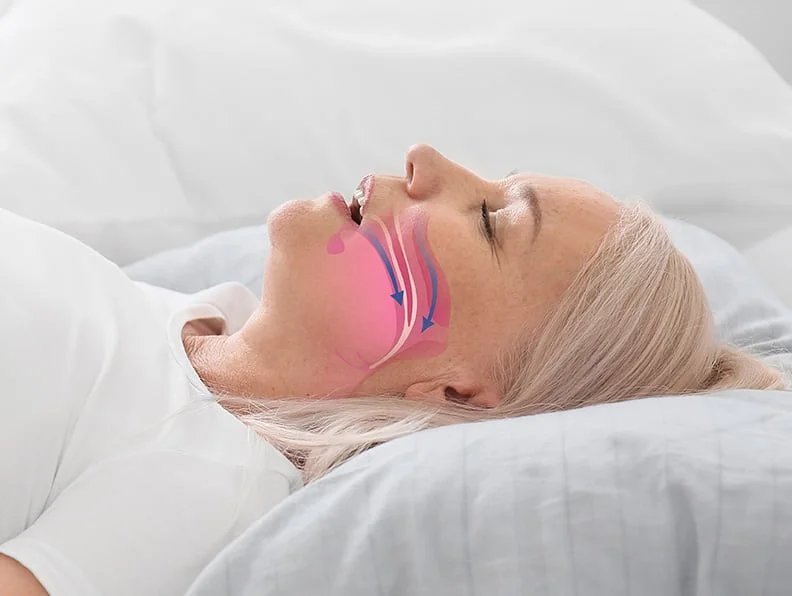Dental Sleep Apnea Treatments
You may be experiencing symptoms of sleep apnea and not even realize it! If you are feeling fatigued after a full night of sleep, having headaches in the morning, are extra irritable, or even having difficulty staying asleep, or if your spouse says you snore, you may have sleep apnea.
Our experienced Ridgeland dentist, Kalil Abide, D.D.S., and his expert team offer dental sleep apnea treatment. Dr. Abide has received special training from the Dawson Center for Advanced Dentistry in Florida. Harmony Dental is also able to bill medical insurance for this service.
Dr. Abide works hand and hand with patients in the sleep clinic. The Harmony Dental team can assist you in determining if your symptoms are a result of sleep apnea and discuss best treatments for sleep apnea. Taking into consideration your personal needs, we can explore the latest treatments for sleep apnea, while also discussing the tried and true sleep apnea treatments.
Most people don’t realize that adjusting the position of your jaw while you sleep can greatly correct the effects of sleep apnea. Because it’s related to your jaw and teeth, dentists offer a non-machine solution.
What Is Sleep Apnea?
Sleep apnea is characterized by a reduction or pause of breathing when sleeping. There are two general types of sleep apnea: obstructive sleep apnea and central sleep apnea. Sleep apnea is a common condition and occurs when the upper airway becomes blocked during sleep. This occurs when the muscles in the back of the throat relax, which results in the airway narrowing or closing when breathing in. The brain senses the inability to breathe and briefly awakens the body from sleep in order to reopen the airway. This awakening is usually so brief that it isn’t remembered. The results could be snorting, choking or gasping and can repeat itself five to 30 times or more each hour. This can go on all night, impairing the ability to reach deep, restful phases of sleep.
Obstructive sleep apnea can occur often and repeatedly, which results in reducing or completely stopping airflow. Central sleep apnea is defined by the fact that the brain does not send the signals needed to breathe. Complex sleep apnea syndrome, also known as treatment-emergent central sleep apnea, occurs when someone has both obstructive sleep apnea and central sleep apnea.

Symptoms Of Sleep Apnea
The signs and symptoms of obstructive and central sleep apneas can overlap, which may make it difficult to diagnose sleep apnea type. The most common signs and symptoms of sleep apnea (for both obstructive and central) includes:
- Loud snoring
- Episodes in which breathing stops during sleep (usually observed by another person)
- Gasping for air during sleep
- Awakening with a dry mouth
- Morning headache
- Difficulty staying asleep (insomnia)
- Excessive daytime sleepiness (hypersomnia)
- Difficulty paying attention while awake
- Irritability
- Memory changes
- Depression
- High blood pressure
- Heart failure
- Stroke
- Heart attack
Treatments Of Sleep Apnea
There are a variety of effective sleep apnea treatments. One may find natural cures for sleep apnea but the most effective treatments often include some sort of medical or dental treatment for sleep apnea. There are also sleep apnea symptoms treatment however, these do not often result in long term cessation of the symptoms, as the cause itself has not been treated/addressed.
The most common treatment for sleep apnea is a breathing device, like a CPAP machine, to help regulate breathing.
We have better solutions!
- Dental treatment for sleep apnea is a mouthpiece. This is typical if you have mild sleep apnea or if your apnea occurs only when you are lying on your back. Mouthpieces, or oral appliances, are devices that you wear while you sleep. If this is what your doctor recommends, or if you need to get an exam, visit Harmony Dental Care today! We will ensure that if an oral appliance is the best for your, it will be custom fit to your mouth and jaw. There are two common types of mouthpieces, both of which serve to open the upper airway. There are also mouthpieces that have features of both types. There are those which cover the upper and lower teeth and hold the jaw in a position that prevents it from blocking the upper airway, known as mandibular re-positioning mouthpieces. There are also tongue retaining devices that hold the tongue in a forward position to prevent it from blocking the upper airway.
- Implants for sleep apnea is another form of treatment. This is where a device delivers stimulation to certain muscles that open the airways during sleep based breathing patterns sensed by the implant.
- Nerve stimulators for sleep apnea, which are surgically placed, can also be an effective treatment. Here, a stimulator for the hypoglossal nerve is inserted, which controls tongue movement. This helps the tongue to keep the upper airway open and unblocked.
- Orofacial therapy is yet another treatment for sleep apnea. This therapy helps strengthen muscles that control the lips, parts of the mouth and face, as well as improving tongue positioning.
Example Sleep Apnea Treatment Devices

Regardless of which treatment you decide is best for you, no one knows better than a dentist that there is a strong link between oral health and sleep apnea. The hugely negative symptoms associated with sleep apnea can be alleviated with expert dental care such as that which you will receive at Harmony Dental Care.
Kalil Abide, D.D.S. is a dentist who specializes in correcting teeth or jaw problems and can help with problems associated with sleep apnea. We here at Harmony Dental Care are specialists who will ensure that the sleep apnea treatment you receive is the right one for you!